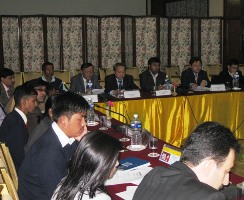Natural Sciences

- © UNESCO/S.H. Ramos
UNESCO's Natural Sciences programme includes environment and sustainable development and aims to improve human security through better management of the environment. Furthermore it seeks to build capacity in science and technology for development to allow the widest possible participation in the knowledge society and to adapt science policy to societal needs.
At the UNESCO Office in Kathmandu, collaborative efforts include an activity on water management in mountain ecosystems for community development and poverty reduction, jointly implemented with a local NGO. Collaboration with UNESCO New Delhi includes a comprehensive review of the Science and Technology capabilities of Nepal, in order to identify areas for international cooperation and technical assistance.
- Fresh Water
UNESCO assists countries in promoting integrated water management - Science Policy
Water and associated ecosystems represent the principal priority for UNESCO’s Natural Sciences programme
News

- 04-01-2011
Collecting science, technology and innovation statistics at December workshop in Kathmandu
More

- 10-11-2010

